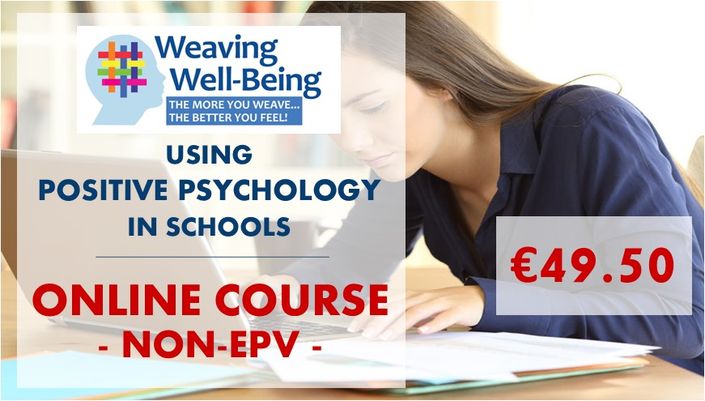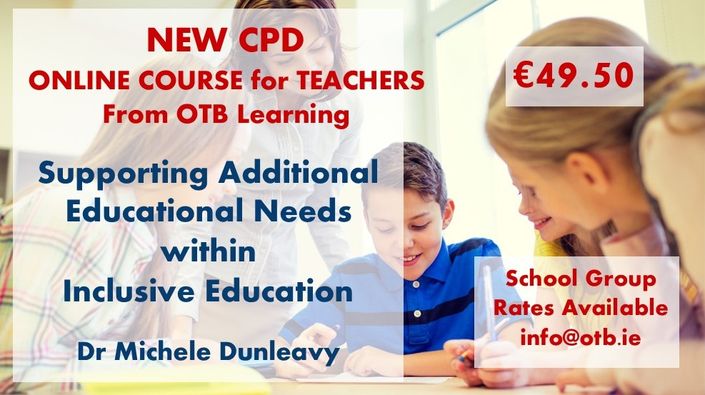
NB: This course does NOT qualify for EPV Days.
Course Description & Details:
Click HERE or on on the DES logo to read the DES Inspection Report of this course for Summer 2021.
This comprehensive online course provides an understanding of the science of Positive Psychology and offers practical and evidence-based strategies for supporting children’s and teachers' well-being. Grounded in the SPHE curriculum, it shows how a whole-school approach can be supported by the SSE process, with particular reference to the Wellbeing Policy Statement and Framework for Practice (DES, 2018).
This course aims to:
- Provide an understanding of the science of Positive Psychology and explore the evidence available to support the benefits of positive psychology strategies
- Explore the benefits of enhancing well-being and, in particular, the link between well-being, learning and successful school outcomes
- Provide a range of evidence-based strategies that can enhance the well-being of children and their learning in the classroom
- Understand how each well-being intervention is grounded in the SPHE curriculum and can be supported by the SSE process
- Explore the relationship between teacher well-being and work quality
- Consider strategies that, if applied, enhance teacher well-being
- Provide an overview of the Weaving Well-Being Programme and explore how elements of the programme can be implemented in the classroom setting
The course is divided into five modules as follows:
- Introduction to Well-Being in the Primary School
- Character Strengths, Positive Emotion and Flow
- Resilience and Mindfulness
- Positive Relationships and Self-Efficacy
- Whole School Approach to Well-Being, Teacher Well-Being and SSE
Weaving Well-Being is the first Irish designed positive mental health programme of its kind which aims to enhance well-being in children aged from 7-12 years within the framework of the SPHE curriculum.
It is underpinned by the concept that a state of well-being is not simply the absence of the negative, but the presence of the positive. The Weaving Well-Being programme gives children the opportunity to weave positivity into their daily lives through a range of activities in a variety of areas such as resilience skills (including mindfulness) and developing self-efficacy through empowering beliefs. The lessons are designed to be implemented within the framework of the SPHE curriculum.
Course Authors:
Fiona Forman is an author, speaker, facilitator and trainer in the area of well-being and Positive Psychology. Having spent many years as a primary school teacher, she is absolutely passionate about placing well-being at the heart of school life and she has seen first-hand the great benefits of empowering children, teachers and parents to understand, value and enhance their own mental health. Fiona holds an M. Sc. in Applied Positive Psychology. She is the co-author of Weaving Well-Being* (for ages: 7-12) and the Irish version Fí na Folláine as well as author of Welcome to Well-Being (for ages: 4-7) and Wired for Well-Being (for ages: 12-15).
Mick Rock is a qualified Executive and Life Coach and a Motivational Speaker who has helped hundreds of people to enhance their lives and achieve a wide variety of goals. As a parent of two boys, Mick is extremely passionate about working with and helping children to deal with the various challenges in their lives, to increase their happiness and wellbeing and to fulfil their true potential. Mick is the co-author of this Weaving Well-Being* programme (for ages: 7-12) as well as the Irish version Fí na Folláine.
________________________________________
*Weaving Well-Being is now the well-being programme of choice in the majority of Irish primary schools and has recently been licensed to Australian publisher Hawker Brownlow Education and UK publisher Pearson Education for use in the schools in their respective markets.
Course Curriculum
-
StartWeaving Well-Being, Fí na Folláine & Welcome to Well-Being: The Resources
-
StartIntroduction to Module 1
-
StartComponents of Well-Being
-
StartTeaching Children the Language of Well-Being
-
StartChildren's Well-Being Self Assessment
-
StartPersonal Mindfulness Moment
-
StartWhy Teach Well-Being at School?
-
StartLinking Well-Being with Successful School & Life Outcomes
-
StartThe Link Between Well-Being and Academic Achievement
-
StartRecent Challenges
-
StartImpact of the Covid-19 Pandemic on Children’s Well-Being
-
StartUkraine: Supporting Teachers who care for Ukrainian Children in their class
-
StartPositive Psychology
-
StartPositive Psychology Interventions (PPIs)
-
StartRainbow Moments in Weaving Well-Being Programme - 3rd Class
-
StartPositive Education
-
StartOverview of the Weaving Well-Being Programme (2nd to 6th Classes)
-
StartOverview of the Welcome to Well-Being Programme (Junior Infants to First Classes)
-
StartModule 1 Further Reading
-
StartConclusion
-
StartModule 1 Learning Log
-
StartModule 1 References
-
StartIntroduction to Module 2
-
StartPositive Emotions
-
StartPersonal Mindfulness Moment
-
StartBoosting Positive Emotions in the Classroom
-
StartRandom Acts of Kindness
-
StartReservoirs of Well-Being
-
StartPositive Emotions in Weaving Well-Being & Welcome to Well-Being Programmes
-
StartPositive Emotions Literacy Links for Children
-
StartPositive Emotions: SPHE Curriculum Links
-
StartPositive Emotions Further Reading
-
StartCharacter Strengths: An Introduction
-
StartPersonal Reflection on Character Strengths
-
StartCharacter Strengths in the Classroom
-
StartInformal Embedding of Strengths in the Classroom
-
StartCharacter Strengths in Weaving Well-Being Programme - 2nd Class
-
StartCharacter Strengths Literacy Links for Children
-
StartCharacter Strengths: SPHE Curriculum Links
-
StartCharacter Strengths Further Reading
-
StartWelcome to Well-Being (Junior Infants to 1st Class): Positive Emotions & Character Strengths
-
StartWhat is Flow?
-
StartIntroducing Flow in the Classroom
-
StartFlow in Weaving Well-Being Programme - 3rd Class
-
StartFlow: SPHE Curriculum Links
-
StartFlow Further Reading
-
StartConclusion
-
StartModule 2 Learning Log
-
StartModule 2 References






